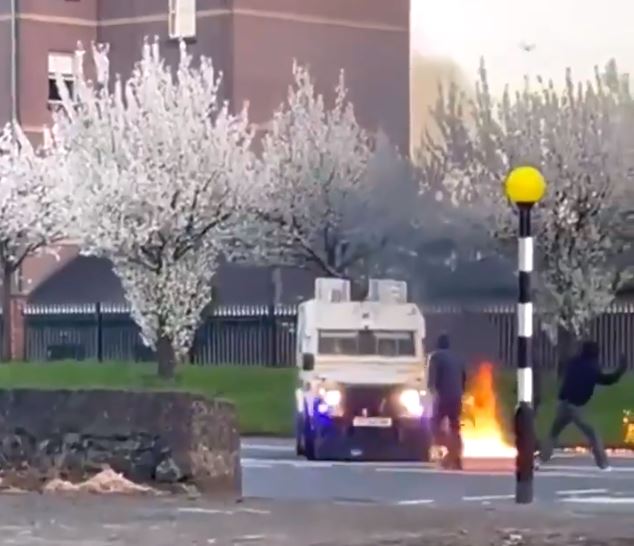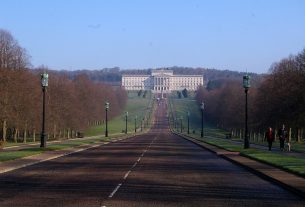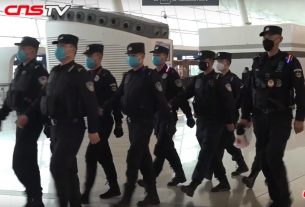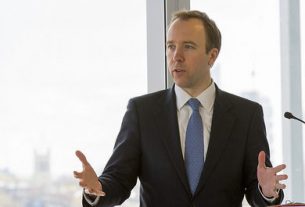The worst violence in almost a decade has flared across Northern Ireland with petrol bombs, car hijackings and vehicle burnouts reported over several nights in Derry, Belfast, Newtonabbey and other loyalist communities.
While politicians engage in a blame game and the police warn of being used as a political football, the Belfast Telegraph’s crime correspondent and politics/security commentator Allison Morris is blaming a “criminal cartel” for orchestrating some of the violence – as a response to successful police operations against their drug dealing and extortion rackets.
PSNI officers have been subject to consecutive nights of attack in several loyalist areas where petrol bombs and bricks have caused multiple injuries and damage to property.
Northern Ireland’s justice minister Naomi Long has called for the rioting to stop “before lives are lost” with tensions in unionist and loyalist communities on the rise for months following Brexit and issues including NI-GB trade, the Irish Sea border, the Northern Ireland Protocol, vaccine rows and culture wars.
A decision not to prosecute Sinn Fein members over their attendance at a funeral last week is pointed to as a spark for consecutive nights of violence across Northern Ireland.
‘Violence is orchestrated by a criminal cartel heavily involved in drugs, extortion and intimidation’
Some 30 petrol bombs were hurled at police in Newtonabbey on Saturday while 27 officers were injured in Belfast and Derry on Friday night and five were injured in Newtonabbey and Carrickfergus when riots resumed on Sunday.
“Last night’s violence was orchestrated by the SEA UDA [South East Antrim Ulster Defence Association] who operate independently from the rest of the organisation and are a criminal cartel heavily involved in drugs, extortion and intimidation of their own community, the recent NCA/PSNI [National Crime Agency/Police Service of Northern Ireland] arrests have clearly rattled them”, tweeted Allison Morris on Sunday.
“Recent attempts by the PSNI to dismantle their leadership is why they’re lashing out, Brexit, the funeral and some of the more irresponsible political utterances have just provided them with convenient cover”.
Foster’s warnings bear Easter fruit
Among those suggesting the first minister is responsible for more than a few “irresponsible political utterances, is Claire Simpson who writes in the Irish News, that repeated warnings from the DUP leader Arlene Foster about “’dangerous’ loyalist alienation bore fruit over the Easter weekend which saw some of the worst rioting since the loyalist flag protests of 2012/13.”
Because not all of the rioting is down to criminal gangs avenging the police, as Morris herself tweeted, the situation in “Derry is different altogether, I would look at towards Brexit and recent events that have been used to stoke tensions as an explanation for what’s happening in the North West”.
The ‘funeral’ her previous tweet refers to is that of veteran republican Bobby Storey, held last June when a mass gathering including senior members of Sinn Fein led to an investigation about possible breaches of Covid restrictions. The decision, last week by the Public Prosecution Service not to take action against 24 Sinn Féin members who attended Storey’s funeral is seen as a catalyst for the violence.
Arlene Foster wasted no time to call for the resignation of PSNI Chief Constable Simon Byrne when it emerged a major factor in not bringing the prosecutions was because the police had engaged with the funeral organisers. Foster’s demand for Byrne to go was voiced by all of the main unionist political parties leading, Mark Lindsay, chair of Police Federation of Northern Ireland to comment on Firday: “I think that is one of the most disappointing things, 23 years on today from the Good Friday Agreement, policing has never been more politicised – it has never been more toxic in our society.”
‘Older more sinister elements’ behind the riots
Lindsay said calls for the chief constable to go “are very worrying. I think whenever we see unionism almost united over this, I think it presents problems for everybody.”
Three days later – and three nights of violence with children as young as 12 involved in the rioting – and Lindsay was back on the BBC to warn that police are paying the price for a lack of leadership across society.
He urged politicians to consider the cost of their inflammatory language and told BBC News NI’s Good Morning Ulster that “older more sinister elements” are influencing younger people to attack officers, adding there is “obviously paramilitary involvement” in the recent attacks.
Chief Superintendent Davy Beck has described the violence as “senseless” and “reckless” and said “there is absolutely no justification for the shameful scenes we have witnessed on our streets.”
He added: “In a time when we are asking everyone to pull together in a health crisis, the people orchestrating this violence and those carrying it out are working against their own community.
“To those who are involved in orchestrating this violence, and to those who are involved in it, stop. It is causing nothing but harm and distress to the local community.
“To those in our community with influence, I would urge you to use that influence so we do not see any further disgraceful scenes of violence on our streets so we can ensure young people do not get caught up in criminality and that they are kept safe and away from harm.”
Speaking on Monday the chief superintendent said he believed a “group of disaffected criminal gangs” are orchestrating the violence are urged restraint.
“There’s no justification for taking these actions out on the street. If you have concerns about policing, you can take those local PCSP (Policing & Community Safety Partnership), you can take them to the Policing Board, you can take them to the Police Ombudsman,” he said.
“There are mechanisms to deal with these issues. It doesn’t have to be on the street. It doesn’t have to affect the rest of your life. Please stop.”




